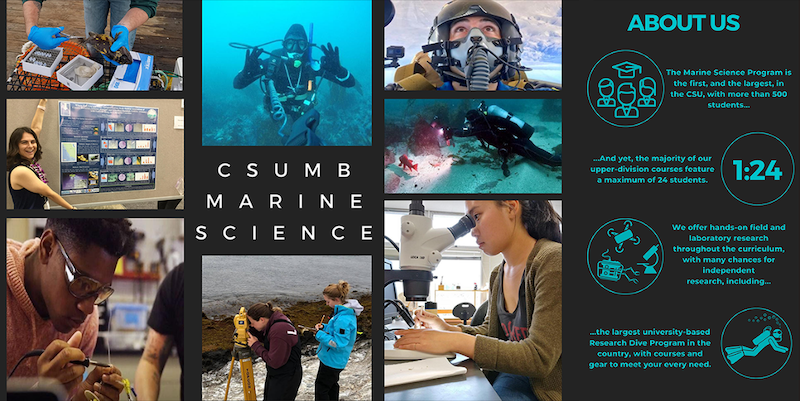Department of Marine Science
FAQ: Transfer Students

Note: You can find additional information at the University's Transfer Student Success Center site
Admissions Information
- CSUMB Transfer Criteria >>> CSUMB requires all transfer students to complete a specific set of courses and requirementsCSUMB Transfer Pathways.
For California Community College students, visit www.assist.org for information on transferable courses to CSUMB. For all other inquiries on transferable courses, contact the Admissions Office: admissions@csumb.edu, (831) 582-3738
- For Spring admittance >>> the application deadline is August 1-31
- For Fall Admittance >>> the application period is October 1- November 30
- For more information on important dates and deadlines, please visit https://csumb.edu/admissions/transfer-student-important-dates-deadlines
Yes, we accept transfer applications for both Fall and Spring semesters.
Yes. Often a transfer student is rejected for not yet completing the core courses. Once you have completed those courses you can apply again.
Yes. There are several types of financial aid that you can receive as an undergraduate student including grants, scholarships, CSUMB awards, loans, and work-study. Visit the Financial Aid website for more information on the determination of your eligibility. Note: most of these awards require a FASFA or CADAA submitted by the March 2nd priority deadline.
Major change requests can be submitted to the Office of Admissions, please review the guidelines for this request.
Admission decisions are based on the evaluation of the self-reported data you submitted on your application. If you were not offered admission or if your application was withdrawn because you missed a deadline, you may submit an appeal. However, unless you have a serious and compelling reason you feel the appeals committee should consider, it is unlikely the committee will reverse the decision. More information on the appeals process.
General Marine Science Information
The MSCI program at CSUMB is the first, and the largest, marine science program in the California State University System. There are approximately 700 students currently enrolled.
You can learn about CSUMB and the MSCI program several ways.
- Enjoy our MSCI Promotional Video
- The College of Science now offers a virtual tour
- CSUMB offers general campus tours daily. Information and tour scheduling
- Set up an appointment with the Department of Marine Science
It is not necessary to participate in any SCUBA diving activities to complete a degree in Marine Science.
The CSUMB Research Diving Program provides comprehensive training across all levels of experience. The four-course sequence begins with MSCI-280 Open Water SCUMB, then proceeds to MSCI-282 Adv & Rescue SCUBA and MSCI-283 NAUI Master Diver, before culminating with MSCI-380 Scientific Diving Techniques. Each has a course fee associated with it. All necessary equipment is provided by the Research Dive Locker. Students with existing SCUBA certifications MAY be able to bypass one or more courses depending on the nature of his/her experience.
No, you do not. At CSUMB, we have a dive locker at the Aquatic Center that can outfit most students from head to toe. You are welcome to purchase and use your own gear, but it is not required. More information on the dive locker equipment can be found here https://csumb.edu/diving/becoming-scientific-diver/
There area many research opportunities for marine science students. The following links highlight examples of faculty expertise, contact information, and potential student funding for research involvement.
Capstone provides students an opportunity to synthesize knowledge, skills, and abilities developed over the course of their learning experience at CSUMB. Marine Science capstone helps students connect their marine science and policy knowledge to critical issues of ocean stewardship, conservation, exploitation, and management at local, national, and global scales. More information on the Capstone process.
Here are a few examples of organizations and companies our students have been employed by as research technicians, research scientists, program administrators, research divers and diving safety officers, and other positions:
- National Oceanic and Atmospheric Administration (NOAA) - including the National Marine Sanctuary Program, the National Marine Fisheries Service, and the NOAA Corps
- California Department of Fish and Wildlife
- Oregon Department of Fish and Wildlife
- Monterey Bay Aquarium
- Monterey Bay Aquarium Research Institute (MBARI)
- National Geographic
- Lindblad Expeditions
- Apple Computer
- Fugro Pelagos (FPI)
- Fishwise
- Aquarium of the Pacific
- Moss Landing Marine Laboratories
The Living Learning Program at CSUMB are communities where students of similar interests and/or academic studies live together. For more information on all housing options, visit the Student Housing & Residential Life website.
Marine science is not the same as marine biology. The CSUMB Marine Science program has an emphasis on interdisciplinary skills rather than on biology alone. However, a Minor in Biology is available on campus to augment training in specific areas of biology. Our Marine Science program differs from other marine-focused programs for its required emphasis on the application of science to management and policy. No other local programs require this integration.
You can find a list of all Marine Science courses available in the course catalog. You can also refer to the following documents on the Marine Science pathways: 4 year pathway (or) 2 year pathway.
Having a minor in another science field can never hurt, as Marine Science students are already required to take a handful of Biology and Chemistry classes.
For more information on a minor in Chemistry, visit here
For more information on a minor in Biology, visit here
Yes. You will be transported by college-owned vans from many of your class field trips. In the specific case of the dive courses, the Instructor will transport all SCUBA tanks to the dive site. Student divers will be required to transport themselves and the rest of their gear separately.
Yes. There is an internship course (MSCI-394) for which you can receive credit for internship activities.
Most of the specific software needed for particular classes will be available in one of our computer labs.